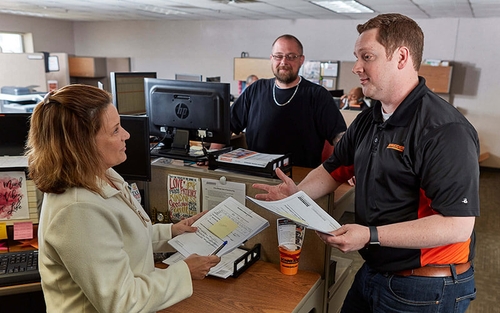Top 15 areas of professional development to focus on


By Ashley Carroll
Estimated reading time: 4 minutes
Whether you’re a seasoned associate or new to the workforce, sharpening your skillsets is key for career growth. That's why many companies have ongoing performance reviews to help associates identify and work toward their career goals and areas of professional growth.
As a human resources business partner, here are my top 15 areas of professional development with tips on how to incorporate them into your day-to-day work.
15 areas of growth for employees
1. Communication.
Ways to develop communication skills:
- Practice what you’re going to say before meetings, presentations and discussions.
- Review emails before you send them.
- Adapt your communication style based on your audience.
2. Time management.
Having good time management skills allows associates to complete projects on time while producing quality work and maintaining a healthy work-life balance. This can greatly reduce workplace stress and improve efficiency.
Ways to develop time management skills:
- Focus on which tasks need to be finished first.
- Break tasks down into manageable chunks.
- Use project management tools to keep track of tasks.
3. Organization.
Organization is one of the top areas for development that people bring up in performance reviews.
Being organized helps associates feel more in control of their work. It can increase productivity and reduce the chances of errors in their work.
Ways to be more organized:
- Maintain a tidy workspace.
- Create daily to-do lists.
- Set aside time for routine tasks.
4. Attentiveness.
Being fully present in conversations allows you to understand different perspectives and gain valuable insights.
By actively listening to your colleagues, leaders and clients, you’ll ensure everyone feels heard and understood. Active listening also prevents misunderstandings and cultivates a more positive work environment.
Ways to be more attentive:
- Maintain eye contact during conversations.
- Ask clarifying questions.
- Have a genuine interest in the speaker's thoughts and ideas.
5. Leadership.
Having strong leadership skills drives success and helps achieve company goals.
Effective leaders motivate their team members and make tough decisions. They also provide guidance and ensure that projects are executed smoothly.
Ways to develop leadership skills:
- Volunteer to lead a team meeting or project.
- Take online leadership development courses.
- Collaborate with other departments at your company.
6. Problem-solving.
Embracing challenges with a creative and innovative mindset enables continuous improvement. It also promotes a solution-first mindset, which helps drive long-term success both for the company and your career.Ways to develop problem-solving skills:
- Brainstorm ideas with your peers.
- Think outside the box.
- Consider unconventional approaches.
7. Adaptability.
Being open to new ideas, perspectives and ways of doing things helps employees navigate change and embrace innovation. The ability to adapt allows associates to thrive in dynamic work environments and maintain a competitive edge in their industry.
Ways to develop an adaptable mindset:
- Seek out new experiences and perspectives.
- Stay up to date with industry trends.
- Be flexible with the way things are done.
8. Collaboration.
Collaboration involves working with team members or different departments to achieve positive results.
Building strong collaborative relationships not only leads to the successful completion of projects but also enhances teamwork and fosters a supportive work culture.
Ways to be more collaborative:
- Promote open and transparent communication.
- Establish trusting relationships.
- Look for opportunities where you can work with others.
9. Productivity.
Productivity directly impacts the efficiency and success of a company. If employees aren’t completing tasks on time, their team – and company – may not reach its goals.
Learning ways to be more productive in the office can help boost your performance and make you feel more confident at work.
Ways to increase productivity:
- Make checklists of daily, weekly and monthly tasks.
- Keep track of dates, meetings and vacations with a calendar or planner.
- Sort the folders on your computer and remove files you no longer need.
10. Transparency.
Being transparent with your leader and colleagues will help them understand your goals and needs, leading to better collaboration, trust and support.
Plus, being open about challenges creates more learning opportunities for growth.
Ways to be more transparent:
- Let your leader know when you need extra support.
- Ask for constructive feedback.
- Set up regular checkpoints with your leader.
11. Feedback.
Receiving constructive feedback on a project you worked hard on isn’t always easy. However, being open to feedback is an important part of professional growth. It's one of the best ways to get better at something!
Ways to be more open to feedback:
- View feedback as an opportunity for development.
- Don’t take feedback personally.
- See feedback as a way to learn something new.
12. Goal setting.
Setting achievable goals gives associates a clear vision of what they need to accomplish, which provides better focus and direction in their work. It also helps associates track their progress and gives them a sense of accomplishment.Ways to set goals:
- Determine which goals are most important and prioritize them accordingly.
- Set due dates for smaller tasks within a larger project.
- Maintain a results-oriented mindset.
13. Relationship building.
People like to work with people they have positive relationships with. Developing professional relationships not only makes work more enjoyable but also fosters a trusting, collaborative work environment.
Ways to build professional relationships:
- Set up sit-ins with other departments to learn more about them.
- Schedule regular check-ins or outings with colleagues.
- Offer your support to colleagues when possible.
14. Business knowledge.
Understanding the big picture of the industry you're working in and the company you work for will give you a better idea of the long-term goals and strategies you need to work toward.
This knowledge will help you make more informed decisions and align your work with the organization's objectives.
Ways to expand business knowledge:
- Set up sit-ins with other departments.
- Attend industry-related events and conferences.
- Read industry-related news.
15. Inclusivity.
Creating an inclusive workplace culture fosters diversity and promotes a sense of belonging among associates. It also gives people a more balanced perspective, leading to better problem-solving and decision-making.
Ways to practice inclusivity:
- Be empathetic.
- Seek out different perspectives.
- Encourage open and respectful communication.
Set your career up for success.




